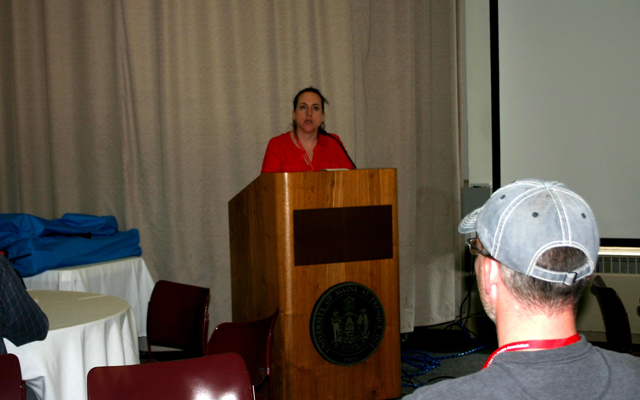
PRESQUE ISLE, Maine — Many employers in Maine have concerns about how the state’s recreational marijuana law affects their business, according to Amanda O’Leary, planning and research associate for the Maine Department of Labor’s Bureau of Labor Standards.
“As of February 1, 2018, the law says that employers can still prohibit the use, sale and cultivation of marijuana and marijuana products at their workplace,” O’Leary said, during the ninth annual Aroostook County Safety Symposium held Wednesday at the University of Maine at Presque Isle. “But there is a paragraph in that law that states that employers cannot refuse to hire someone because they have used marijuana outside the workplace for recreational purposes.”
O’Leary told employees and company officials during her keynote address that that section of the law has complicated the ways in which Maine employers enforce drug testing policies. Many companies have policies that state that if an individual tests positive for drugs, they can refuse to hire that person. But the law does not allow firms to discriminate against individuals who have used marijuana outside of work.
When Mainers voted to legalize recreational marijuana in November 2016, they created many legal dilemmas for companies that want to enforce marijuana testing and promote a drug-free work environment, O’Leary stated.
“Some lawyers say that they would not want their clients to discriminate against employees who use recreational marijuana. Others have said that they would definitely back up their client if they wanted to test employees and not hire those who had positive test results,” O’Leary said. “The way the law is worded makes it very confusing as to whether not hiring an individual in those situations is discrimination.”
After the 2016 referendum vote, the state Legislature formed a marijuana legalization implementation committee to draft rules and regulations concerning retail sales of marijuana and to consider changes to the section regarding employee drug testing and hiring policies. Gov. Paul LePage vetoed a previous version of the committee’s bill.
The state House of Representatives and Senate both have since passed a new version of LD 1719, but its fate will depend on whether LePage vetoes or passes the act into law.
The new legislation eliminates the paragraph that barred employers from not hiring based simply on positive marijuana drug test results. Instead, the new version states that employers are not required to permit or accomodate the use, consumption or cultivation of marijuana in the workplace; can enact and enforce workplace policies restricting employees from using marijuana at their workplace; and can discipline employees who they find to be under the influence of the drug.
“Currently the Maine Department of Labor allows employers to conduct pre-employee drug testing under probable cause, also known as reasonable suspicion, and random testing or arbitrary testing, meaning once a year on the employees’ date of hire,” O’Leary said.
With probable cause testing, employers aren’t allowed to base their determination solely on an anonymous tip, she said. Employers also can’t simply test an employee because they have reason to believe that individual has used marijuana outside of the workplace.
Employers can test, however, if they believe the employee has used during work hours, or is impaired at work, or was under the influence when an accident happened at work.
She added that marijuana testing becomes even more complicated if an employee uses medical marijuana approved by their primary-care doctor.
“Some employers accept the individual’s medical marijuana card and have the test result changed to negative,” O’Leary said. “Others refuse to accept the card and offer the employee the opportunity to take rehab sessions. That makes for muddy waters if the employee uses marijuana as their medication and doesn’t believe that they need rehab treatment.”
O’Leary recommended that employers stay informed on the latest marijuana laws in Maine and educate themselves on how to recognize common signs and symptoms of marijuana impairment. She is the instructor for the Department of Labor’s Impairment Detection Training for Employers class offered through the department’s safety institute in Augusta.
Due to increased demand from employers, O’Leary hopes to later offer the daylong course at various companies in northern Maine. She taught a brief version of the class, which detailed current drug testing laws and how employers can respond to impairment situations, earlier in the day Wednesday as part of the symposium at UMPI.
“I have not yet experienced the effects of the legalization of marijuana in my own workplace, but other employers have spoken with me about their concerns,” said Miles Williams, safety manager for Smith Farms in Westfield and president of the Aroostook County Safety Directors Association, who hosts the annual safety symposium.
“Hearing from the Department of Labor can give employers ideas of what they can do for drug prevention programs in their business and help employees who may have substance abuse problems,” he added.




